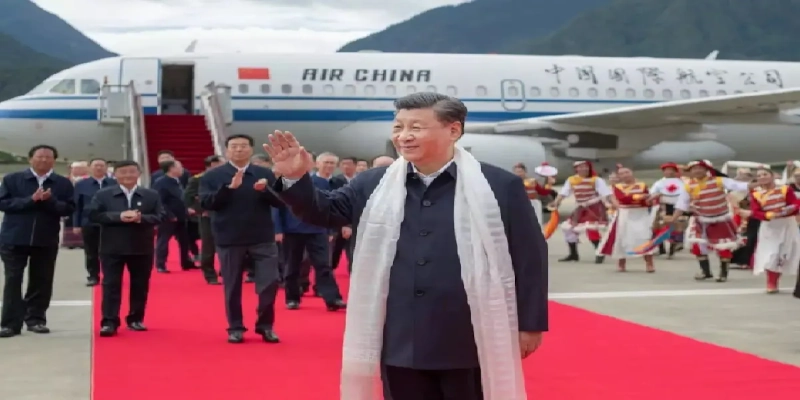Dharamshala, 23rd July: On Friday, the official Xinhua news agency reported Xi(China’s President Xi Jinping) landed in Tibet on Wednesday, landing in Nyingchi, a town near the Arunachal Pradesh border in India. According to the Xinhua story, Xi traveled to the Nyang river bridge to view the Yarlung Zangbo River, whose Nyang tributary is the second largest. He also inspected the recently constructed Sichuan-Tibet railway in Nyingchi town and its train station.
According to videos that circulated across social media all day Thursday, Xi was also seen in Lhasa. On Friday, the visit was officially confirmed for the first time. Xi’s visit to the Tibet Autonomous Region (TAR) is his first since becoming general secretary of the Communist Party of China in 2012. He paid a visit in 2011 as Vice-President.
The China State Railway Group says that it takes 3.5hours to cross between Nyingchi, the border town of Tibet and the capital of the Tibetan Autonomous Region (TAR), with its 435-kilometer route, which started to build in 2014, has a design speed of 160 kilometers an hour.
The Lhasa-Nyingchi railways have lately been constructed on the Arunachal border in the south and south-eastern parts of Tibet. China completed the construction last month of the “Second Significant Corridor” in Medog County, which borders Arunachal, a strategically important route across the Yarlung Zangbo Grand Canyon.
The railway line between Sichuan and Tibet links the two provincial capitals. The track is the Lhasa-Nyingchi railway. President Xi considered it to be as vital a strategic project to launch publicly and called it “an important step to preserve national unity and a substantial stride to promote the economic and social development of the Western area.” This would be the second railway line to connect Tibet to the interior(mainland) following the already existing Qinghai-Tibet railway.
The first phase of a new train line was completed in December 2018, starting with Chengdu, Sichuan’s provincial capital, and ending at Yaan-Nyingchi, which is 1,011km long, is scheduled for 2030. State media reports that the railways will “carry and dispatch advanced equipment and technology from the rest of China to Tibet,” according to Zhu Weiqun, senior party official formerly responsible for Tibet politics. “The railway can function as a fast track to convey strategic supplies if a border crisis happens,” he added.
Image Source: stuffunknown

